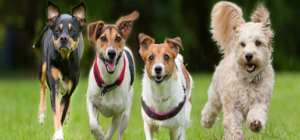
Adolescence in dogs is a stage just as complicated as with humans, catching everyone at home off guard when the puppy begins to show its first signs of rebellion. A new world of experimentation, play and mischief opens up for the not-so-little puppy, and his human companions must be prepared to handle this stage.
Indice
Adolescence manifests itself at different times depending on the breed of the puppy, becoming a step towards adulthood. A dog’s development must be managed carefully to ensure that it performs optimally, so knowing how to care for your puppy when it reaches adolescence is vital.
When does the adolescent stage begin in puppies?
The awakening of adolescence in the canine depends mainly on its breed and is also influenced by the food it receives. Small breeds usually go through this stage more quickly, starting at four to six months of age and lasting no more than six months in this stage.
Large breeds usually manifest it between eight and ten months of age, while giant breeds take a little longer to enter it, this being around twelve to eighteen months of age.
Feeding a puppy in the adolescent stage
As in all its stages, the dog will need to receive a balanced diet that covers all its needs. In adolescence as such, puppies receive an overflow of energy and need a specific amount of nutrients according to their breed.
In addition, as this is the main stage of transition to adulthood, nutritional care becomes even more important. For it is here that the dog begins to develop into an adult, which includes not only sexual maturity, but also bone development.
Reinforcement of training
In dog adolescence, the puppy will have a high tendency to disobey and show other types of negative attitudes due to hormones; being aggressiveness and attacking any object within reach, some of the most characteristic ones.
In spite of this, the person should not give up training, on the contrary, he/she needs to direct more energies to it. Socialization, interaction with other animals and environments, recognition of commands, among other crucial elements for their life, must be present in all their stages. So patience and perseverance are the key.
However, it is important to recognize when a new behavior in the dog is natural and necessary for its development, and when it is not. This will avoid negatively affecting their stage of adolescent socialization and discovery.
Image courtesy of (www.hillspet.es), all rights reserved.







